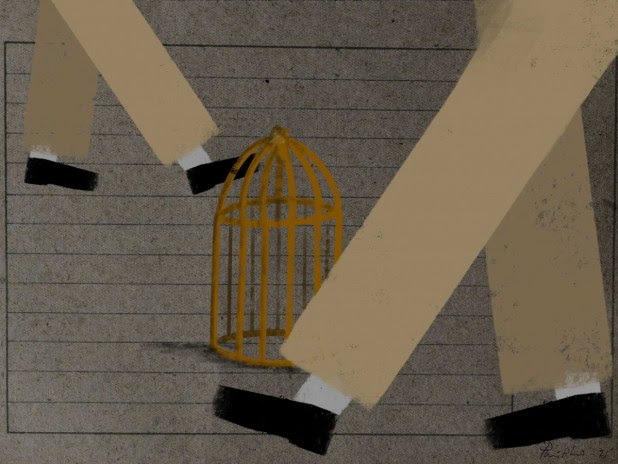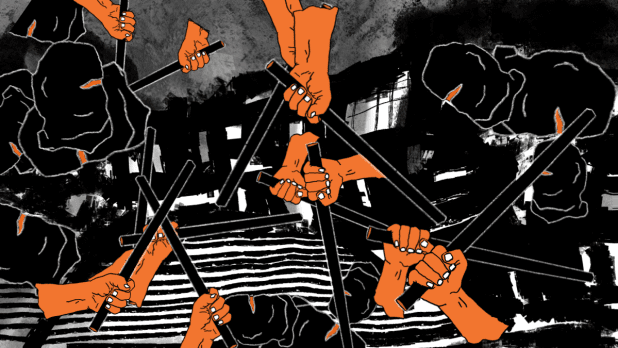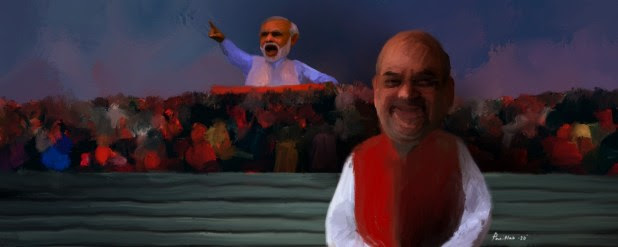The targeting of independent media, massive corporate and economic corruption, increasing collapse of law and order, impunity laws, vengeful circulation of nationalist propaganda and hate speech, and political, gendered and sexualised violence are aggressively persistent. Human rights defenders, journalists, scholars, students, allies and their principled articulations are being criminalised as anti-national. The repression of caste-oppressed groups, foremost of Adivasis and Dalits, and the minoritisation of non-Hindu communities, is rampant. Calls to genocidal violence via the extermination of Muslims and dog whistles to foment vigilantism among Hindu nationalists, reverberate.
The normalisation of arbitrary governance saturates the everyday with precarity for hundreds of millions in India today, prompting widespread foreboding and social and spiritual breakdowns. Turbulent markers of religion, ethnos and identity are weaponised to depict dominant Hindus as the national race and “authentic citizens.” Fault lines between minority and majority erupt across the body politic, engineering difference as conflict and posing the minority/“Other” as parasitic, dangerous.
Uttar Pradesh and Yogi Adityanath
Uttar Pradesh has a population of approximately 200 million people, including 38 million Muslims. The incumbent head of state, Yogi Adityanath/Ajay Mohan Bisht, became chief minister in 2017 and was reelected in 2022. In a video that surfaced in 2014, Adityanath reportedly stated: “If [Muslims] take one Hindu girl, we’ll take 100 Muslim girls. If they kill one Hindu, we’ll kill 100 Muslims.”
Adityanath has supported various campaigns to weaken and override the rights of Muslims. This has emboldened Hindu nationalism, including far-right organisations such as the Rashtriya Swayamsevak Sangh, which in 2017 reportedly operated 8,000 shakhas or branches in UP. In 2018, RSS leader Mohan Bhagwat stated that the organisation was positioned to mobilise an army within three days. The Adityanath government began a process to withdraw 131 criminal cases against alleged perpetrators in the Hindu-led mass violence against Muslims in Muzaffarnagar in 2013, and in 40 of 41 Muzaffarnagar cases, including in four gang-rape cases, the accused were acquitted. In January 2019, the prime accused and 16 others out on bail in the 2015 lynching of Mohammad Akhlaq were seen cheering at the front of an Adityanath rally.
Extrajudicial killing and torture
An unnerving 23,612 events of riots/organised violence were reported in UP during 2017-2019, while 6,126 such events were reported in 2020, and 5,302 in 2021. In December 2018, four United Nations Special Rapporteurs wrote to the Government of India regarding extrajudicial killings by police officers in UP between March 2017, when the Bharatiya Janata Party government took power, and June 2018. Extrajudicial killings and custodial torture from March 19, 2017 to September 28, 2021 include “encounter” cases where police reportedly shot individuals in street protests and enacted custodial deaths, victimising individuals on the basis of their religion and caste. Women experienced violence, including in police custody. There is no reporting on LGBTIQA-identified persons. UP officials with alleged direct responsibility for extrajudicial killings and/or torture of civilians that took place between March 2017 and September 2021 include police personnel in the rank of Deputy Superintendent of Police, district level Superintendent of Police and Constable.

Illustration: Pariplab Chakraborty
In UP, 166 people were reportedly killed and more than 4,453 injured in encounters between March 2017 and October 2022. As of August 2020, about 37 percent of the victims were Muslims. Between November 24, 2020, and August 31, 2021, at least 189 people were arrested in UP for violating the anti-miscegenation “love jihad” law. UP reportedly witnessed 451 custodial deaths in 2020 and 501 in 2021. In May 2022, a 22-year old man detained by UP police in Lucknow on speculation of cattle slaughtering was reportedly tortured with electric shocks and violated with a stick.
The extrajudicial killing and custodial torture of Bahraichi, a Dalit man, reportedly took place in July 2021. His family reportedly had a land dispute with a powerful landlord, Mahendra, who filed a police complaint against Bahraichi and other family members for abducting Mahendra’s daughter. When Bahraichi went to the police station to file a case, he was arrested. Bahraichi was allegedly tortured in police custody, leading to his death. In their version of events, the police reportedly noted that Bahraichi had slipped and fallen while in custody and died. The Wire, having seen the photographs of Bahraichi’s injuries, disputed that the injuries were from falling.
In September 2017, UP Police increased “award money” for arresting criminals at different police ranks, and authorised police chiefs to “announce rewards of up to Rs. 1 lakh for a team that carries out an encounter.” In March 2018, Adityanath reportedly gave special awards to police officers with high “encounter” killing numbers. In October 2021, Adityanath highlighted

Illustration: Pariplab Chakraborty
Prejudicial citizenship
Extrajudicial killings reportedly took place during the December 2019 protests against the Citizenship Amendment Act, 2019. This prejudicial law is akin to the Nuremberg Laws instituted in 1935 in Nazi Germany, and privilege Hindus in defining citizenship, particularly targeting Muslims. Police attacked civilians in various states across India, including with lethal force.
In UP, reportedly 23 persons died, 21 of them due to bullet wounds. Three police personnel were alleged as the direct accused—a Station House Officer, the City in-Charge, and a Constable. Criminalising peaceful assembly, police opened fire with live bullets, and 700+ persons were detained. The UP government sought to blame the violence on Muslims. Approximately 3,000 persons of predominantly Muslim descent were reportedly arrested under false charges across UP and 350 First Information Reports were allegedly filed against 5,000 “named individuals” and 100,000 unnamed persons.
The extrajudicial killing of Mohammad Suleman (Muslim descent, age 20) reportedly took place in December 2019. His family reported that he was picked up by police while returning from a mosque, taken to Mohallah Shekhan, and shot to death on December 20. The police filing reportedly stated that Suleiman had taken an officer’s pistol and shot at a Constable, who shot back and killed Suleiman. In July 2020, the Special Investigation Team looking into Suleiman’s case found innocent the six police officers accused in his killing, alleging Suleiman had taken part in protests.
Leadership and abetment
Extrajudicial killings documented here violate the right to life as established in international human rights law and the International Covenant on Civil and Political Rights (ICCPR). The instances of torture to individuals in custody noted in this article amount to cruel, inhuman, or degrading treatment under international law, carried out by government officials acting under the authority of law.
Indian law does not hold the executive branch of government accountable through command responsibility. Alleged perpetrators, including the elected head of UP government, may be held accountable for abetment or negligence. Similarly, the highest ranking officials at the UP Home Department carry responsibility in overseeing the UP Police. Chapter V of the Indian Penal Code, 1860, addresses the crime of abetment. An individual who encourages or provokes another person to committing an act, or aids by unlawful omission its enactment, may be defined as an abettor.

Illustration: Pariplab Chakraborty
Adityanath, the highest executive functionary in UP, is routinely also its Home Minister. The UP police is under the command of the Chief Minister, as the “law and order” portfolio is a state responsibility per the Indian Constitution. Police leadership includes the Principal Secretary, Additional Chief Secretary, and the Director General of Police. Any statement made by a Chief Minister which encourages the police to violate the law therefore may amount to an abetment of the crime. Punishment for abetment of an offence is customarily stringent and a Chief Minister may, therefore, be charged with abetment provided that the main offence is established.
Descent into the abyss
In 2022, Prime Minister Modi attended Adityanath’s swearing-in ceremony. In December 2022, Adityanath reportedly asserted that opposition parties, the Congress and Aam Aadmi, “should be hanged” as they were impediments to India’s progress. In February 2023, Adityanath reportedly claimed that: “India is a Hindu Rashtra [nation], because every citizen of India is a Hindu.”
Absolute nationalism targets those marginalised across India, particularly its Muslim inhabitants. Making aggression ordinary presents violence as inevitable and, in the context of India’s emergence as a global player, crisis and militarisation as propitious to national enterprise. The use of hate and arbitrary power and calculated killings by Hindu nationalists reveal an ominous disregard for democracy, a forewarning of what is to come.
Angana P. Chatterji (@ChatterjiAngana) is Co-chair of the Political Conflict, Gender and People’s Rights Initiative, Center for Race and Gender, University of California, Berkeley. Dr. Chatterji’s publications include: BREAKING WORLDS: Religion, Law, and Nationalism in Majoritarian India; The Story of Assam and Majoritarian State: How Hindu Nationalism is Changing India.
Post Disclaimer
Disclaimer: Unchecked by consequences, a new authoritarianism is unfolding in India - Views expressed by writers in this section are their own and do not necessarily reflect Latheefarook.com point-of-view